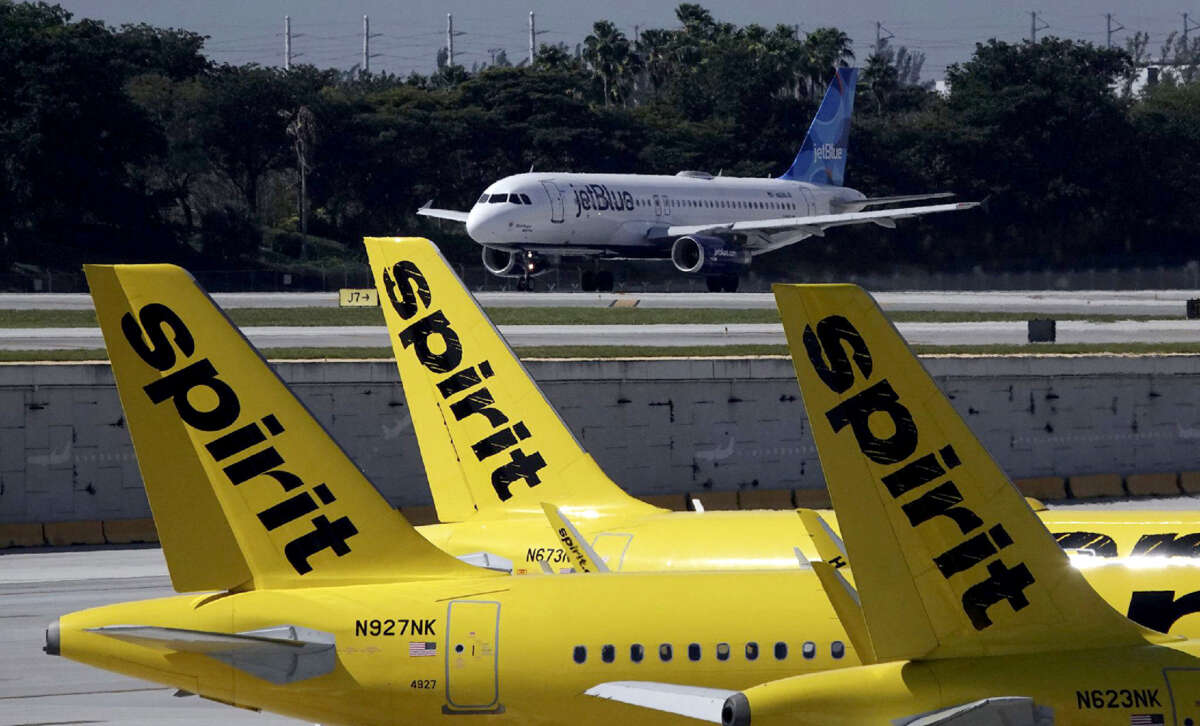The Department of Justice (DOJ) has filed a lawsuit to block a merger between JetBlue Airways and Spirit Airlines in the latest antitrust move from the Biden administration.
DOJ officials are challenging the $3.8 billion deal on the grounds that it would further reduce competition and potentially cause a jump in air fares in a time of already heavy consolidation and soaring flight prices.
“If the acquisition is approved, JetBlue plans to abandon Spirit’s business model, remove seats from Spirit’s planes, and charge Spirit’s customers higher prices,” the lawsuit reads. “JetBlue’s plan would eliminate the unique competition that Spirit provides — and about half of all ultra-low-cost airline seats in the industry — and leave tens of millions of travelers to face higher fares and fewer options.”
Airline prices reached a high last year, jumping in the fall by 25 percent over the previous year as Americans prepared to travel for the winter holidays. Extreme consolidation in the airline industry has left customers with few choices but to book with a handful of airlines; just four airlines (American Airlines, Delta, United and Southwest) make up 80 percent of passenger air traffic.
The JetBlue-Spirit merger would even further increase consolidation. Currently, JetBlue is the sixth largest airline. Allowing it to merge with Spirit would make it the fifth largest airline, yielding JetBlue a market share of 10 percent.
JetBlue has argued that the merger would bring down prices, forcing other airlines to lower their fares to compete with the two lower-cost airlines. However, antitrust officials have said that the loss of Spirit Airlines’s independence would mean the loss of Spirit’s extra-low fares, and that JetBlue’s proposed changes to Spirit flights, like removing seats, would force the airline to raise prices to recoup lost fares.
Airline worker unions have been torn about the merger. The Association of Flight Attendants-Communications Workers of America, which represents about 5,600 Spirit flight attendants, has expressed support for the merger; Association of Flight Attendants president Sara Nelson wrote in a letter that she believes the merger would increase competition in the industry and that it was the “anti-merger, merger.”
However, the Transport Workers Union, which represents 6,800 JetBlue flight attendants, raised concerns in a separate letter last month about the potential anti-competitive effects of the merger. “We have yet to see a credible argument that a consolidated JetBlue/Spirit will enhance competition in the domestic airline industry,” the letter said. The union pointed out that hard-fought union victories could be lost by the merger.
Lawmakers have also sounded the alarm about the merger. In September, Sen. Elizabeth Warren (D-Massachusetts) wrote to Department of Transportation Secretary Pete Buttigieg urging him to block the deal, saying it would be in the public interest to do so.
She brought up concerns similar to those of Biden officials, saying that the current dominance of just a few airlines has already demonstrated the dangers of allowing a handful of airlines to control the industry.
“Airline industry competitiveness is in free fall, and consumers are feeling the consequences,” Warren wrote. Major airline “dominance has been achieved not primarily by offering better, more reliable service to passengers at lower fares but instead through a series of airline mega-mergers that have reduced service quality and increased fares.”
Join us in defending the truth before it’s too late
The future of independent journalism is uncertain, and the consequences of losing it are too grave to ignore. To ensure Truthout remains safe, strong, and free, we need to raise $27,000 in the next 24 hours. Every dollar raised goes directly toward the costs of producing news you can trust.
Please give what you can — because by supporting us with a tax-deductible donation, you’re not just preserving a source of news, you’re helping to safeguard what’s left of our democracy.
